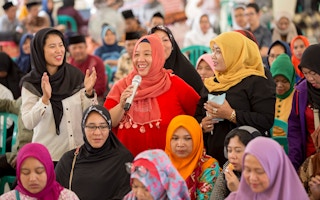Women’s political representation in Indonesia may fall for the first time since the 1999 election, even before the voting starts.
The threat arose when Indonesia’s electoral commission tweaked policy around the country’s 30 per cent gender quota on party lists, changing a previous rule that rounded up decimal figures in service of meeting the requirements.
Affirmative action policies that boost the representation of women work, even applied improperly. In Indonesia, affirmative action policies have played a critical role in boosting the electoral fortunes of women.
Without such policies, the challenge to close the political gender gap becomes even harder: it’s tougher to get more women into politics and promote a gender-sensitive environment when one gender has no legal obligation to bring the other into the fold.
Since the establishment of Indonesia’s quota policy in 2004, the number of women in the national parliament has increased steadily, jumping from 17.32 per cent at the 2014 election to 20.52 per cent in 2019. At the provincial level, the number has climbed from 16.4 per cent to 18 per cent, while it has edged up slightly from 14 per cent to 15.2 per cent at the municipal level.
The proportion of women in the Regional Representative Council (Dewan Perwakilan Daerah Republik Indonesia, DPD RI) has increased by over 20 per cent from 2014 to 2019 (from 25.76 per cent to 30.88 per cent). That 2019 election marked a watershed milestone in Indonesian history, with women’s political representation in the legislature reaching an all-time high.
“
Indeed, Indonesia’s democracy index has begun to decline in recent years, influencing changes in Indonesia’s status as a country no longer seen by all as truly democratic.
On the other hand, women’s political representation in Indonesia is progressing somewhat slowly compared to neighbouring countries in Southeast Asia. According to Indonesian research institute Puskapol UI, the main driver behind this is the reluctance within political parties to promote women candidates.
Most political parties perceive affirmative action as an administrative hurdle to clear. To meet the quotas, parties tend to nominate women as candidates who come from their nearest circles, such as family, friends of party elites, or popular figures. As a result, a substantial percentage of elected female candidates hail from political dynasties, as was seen in the 2019 national election.
The electoral commission’s new policy is a setback for affirmative action, amid public encouragement from Indonesians to strengthen female representation in the 2024 elections. Despite widespread public opposition and a Supreme Court decision ordering the regulation be cancelled, the electoral commission has insisted on retaining it.
The policy looks set to significantly decrease the number of female candidates standing in the 2024 election. In November 2023, the electoral commission ratified the ‘Permanent Party List’ for the upcoming election. Of the 84 electoral districts and 18 parties participating, only one party met the minimum quota of 30 per cent female candidates on their nomination list.
This has ramifications beyond the representation of women. Indonesia’s electoral organisers have worked incrementally to lift the country’s democracy score, based on International IDEA assessments, but recent malpractice from the electoral commission has jeopardised the progress.
Ratifying a party list that fails to meet the gender quota, ignoring the Supreme Court and allowing parties to influence the commission’s regulations will lead to Indonesia taking a hit in the democracy index, especially in electoral democracy.
Indeed, Indonesia’s democracy index has begun to decline in recent years, influencing changes in Indonesia’s status as a country no longer seen by all as truly democratic. The Economist Intelligence Unit, for instance, classifies Indonesia as a ‘flawed democracy’, while Freedom House categorises it as a ‘partly free’ country.
Hurriyah is a Lecturer and the Director of the Centre for Political Studies, Universitas Indonesia. Hurriyah can be contacted at hurriyah@ui.ac.id.
Originally published under Creative Commons by 360info™.


















